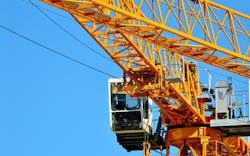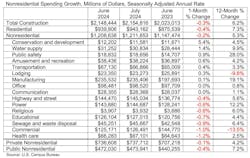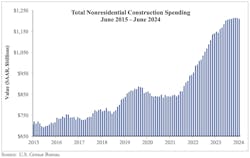Nonresidential construction spending decreased 0.2% in June
National nonresidential construction spending declined 0.2% in June, according to an Associated Builders and Contractors analysis of data published today by the U.S. Census Bureau. On a seasonally adjusted annualized basis, nonresidential spending totaled $1.21 trillion. Nonresidential construction has expanded 5.3% from a year ago.
Spending was down on a monthly basis in 7 of 16 nonresidential subcategories. Private nonresidential spending fell 0.1%, while public nonresidential construction spending was down 0.4% in June.
“A new trend in nonresidential construction is emerging, and it’s not a good thing,” said ABC Chief Economist Anirban Basu. “Despite a bevy of megaprojects in certain parts of the nation, overall nonresidential construction spending appears to have entered a period of stagnation. The flattening of momentum has been apparent for the better part of a year, but the impact of higher interest rates, tighter credit conditions and a softening economy is increasingly apparent in the most recent data, which indicate that aggregate nonresidential construction spending is in decline.
“Despite a recent loss in spending growth momentum, many contractors remain upbeat, according to ABC’s Construction Confidence Index, anticipating growth in revenues and payrolls over the next six months,” said Basu. “But with interest rates staying higher for longer, it appears that many projects are being put on hold, limiting construction starts, suppressing backlog and perhaps eventually eroding current contractor confidence.”


